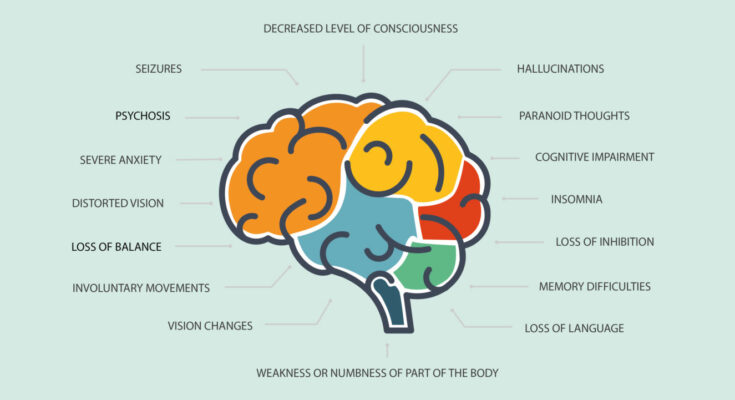Encephalitis Treatment: Encephalitis, a critical condition characterized by the inflammation of the brain, presents a challenge to healthcare professionals worldwide.
This article delves into the comprehensive diagnosis and treatment options available for encephalitis, offering insights and guidance for both patients and healthcare providers.
What is Encephalitis?
Encephalitis is a condition characterized by the inflammation of the brain tissue. This inflammation can result from a variety of causes, including viral infections, autoimmune diseases, or even as a secondary response to an infection elsewhere in the body. The severity of encephalitis can vary widely; some cases may be so mild that they cause no noticeable symptoms, while others can be severe and life-threatening. Understanding encephalitis is crucial for recognizing its impact and the importance of seeking medical attention promptly.
Causes of Encephalitis
The causes of encephalitis can be broadly categorized into two groups: infectious and non-infectious causes.
- Infectious Causes: Viral infections are the most common cause of encephalitis. These can include herpes simplex virus (which is the most common cause of severe sporadic encephalitis), enteroviruses, mosquito-borne viruses such as West Nile virus, and tick-borne viruses. Bacterial, fungal, and parasitic infections are less common but can also lead to encephalitis.
- Non-Infectious Causes: Encephalitis can also occur as a result of autoimmune diseases or as a secondary immune response to an infection elsewhere in the body. In some cases, encephalitis can be triggered by vaccines or certain medications, though this is rare.
Symptoms of Encephalitis: Early Signs and Progression
Recognizing the early signs of encephalitis can lead to a timely diagnosis and treatment, potentially mitigating the severity of the condition. Symptoms of encephalitis can range from mild flu-like symptoms to more severe and life-threatening conditions. Early signs often include:
- Fever
- Headache
- Fatigue or weakness
- Joint pain
As the condition progresses, more serious symptoms may develop, including:
- Confusion, agitation, or hallucinations
- Seizures
- Sensitivity to light (photophobia)
- Unsteady gait
- Stiff neck or back
- Sudden severe dementia or memory problems
- Loss of consciousness
It’s imperative to seek medical attention if you or someone you know is experiencing these symptoms, especially if they are severe or worsening. Early medical intervention can be crucial in managing encephalitis effectively.
By understanding what encephalitis is, its causes, and the symptoms to watch for, individuals can better advocate for their health and seek appropriate care when needed. Awareness and knowledge are key tools in combating this serious condition.
Diagnosing Encephalitis
Recognizing the symptoms early and understanding the diagnostic process are crucial steps in managing this condition effectively. This section will guide you through the initial assessment, diagnostic tests, and the inherent challenges faced during the diagnosis of encephalitis, making the information both accessible and actionable for readers.
Initial Assessment: When to Seek Medical Attention for Symptoms
Encephalitis symptoms can range from mild flu-like signs to more severe neurological issues, including confusion, seizures, severe headache, fever, and sensitivity to light. Given the broad spectrum of symptoms, it’s essential to seek medical attention when you or someone you know experiences sudden and unexplained neurological changes. Early intervention can be pivotal in mitigating the risks associated with encephalitis, emphasizing the importance of being vigilant and responsive to the body’s distress signals.
Diagnostic Tests
Upon seeking medical help, healthcare professionals may recommend a series of diagnostic tests to confirm encephalitis. These tests are designed to assess brain function and pinpoint the inflammation’s cause and extent:
- MRI (Magnetic Resonance Imaging): Offers detailed images of the brain, highlighting areas of inflammation.
- CT (Computed Tomography) Scans: Provide cross-sectional images of the brain, used to detect swelling or other abnormalities.
- Lumbar Puncture (Spinal Tap): Involves collecting and examining cerebrospinal fluid to identify infections or diseases affecting the brain.
- EEG (Electroencephalogram): Measures electrical activity in the brain and can reveal patterns indicative of encephalitis.
- Blood Tests: Help identify viruses or bacteria that might have triggered the inflammation.
Each test contributes uniquely to the diagnostic process, offering insights that guide treatment decisions.
Challenges in Diagnosing Encephalitis
Diagnosing encephalitis presents several challenges, primarily due to its varied symptoms and the potential for it to mimic other neurological disorders. The condition’s complex nature necessitates a comprehensive evaluation, combining medical history, symptom analysis, and diagnostic tests to arrive at an accurate diagnosis. This multidimensional approach ensures that treatment can be tailored to the specific needs of the patient, addressing the root cause of the inflammation and mitigating its impact on the brain.
Furthermore, the urgency in diagnosing encephalitis underscores the need for healthcare systems to have robust mechanisms for rapid and accurate assessment. It highlights the critical role of medical professionals in interpreting test results within the context of clinical presentations, ensuring patients receive the care they need promptly.
However, understanding the steps involved in diagnosing encephalitis, from initial assessment through to the comprehensive evaluation of diagnostic tests, empowers individuals to seek timely medical intervention. Recognizing the challenges inherent in diagnosing the condition underscores the importance of a thorough and nuanced approach to care, pivotal in managing encephalitis effectively.
Encephalitis Treatment Strategies
Understanding the available treatment options and the importance of comprehensive care can significantly influence recovery outcomes. In this guide, we’ll explore the effective strategies for managing encephalitis, focusing on supportive care and the critical role of rehabilitation.
List of Treatment Options
Supportive Care: The cornerstone of encephalitis treatment, supportive care, focuses on relieving symptoms and preventing complications. This approach is vital for managing fever, seizures, and dehydration—common challenges in encephalitis patients. Supportive care ensures that the body’s vital functions are maintained while the immune system fights the infection. It may include:
- Fever management: Using medications and cooling strategies to control high body temperature.
- Seizure control: Administering antiepileptic drugs to prevent or manage seizures.
- Hydration: Ensuring the patient receives adequate fluids to prevent dehydration, either orally or through intravenous (IV) therapy.
The Role of Rehabilitation: Rehabilitation plays a pivotal role in the recovery from encephalitis. As the patient begins to recover, physical, occupational, and speech therapy become essential in helping regain lost functions and abilities. These therapies are tailored to each patient’s specific needs and can include:
- Physical therapy: Aims to improve muscle strength, coordination, and mobility.
- Occupational therapy: Focuses on enhancing daily living skills and independence.
- Speech therapy: Helps in recovering communication skills and managing swallowing difficulties.
Rehabilitation is a critical step in the journey towards recovery, offering patients the best chance at regaining their quality of life. The multidisciplinary approach ensures that all aspects of the patient’s health and well-being are addressed, facilitating a more comprehensive recovery.
By focusing on both immediate treatment needs and the importance of rehabilitation, this guide aims to provide a clear and helpful resource for those affected by encephalitis, highlighting the path toward recovery through effective treatment and dedicated care.
Complications and Management of Encephalitis
Potential Complications
Encephalitis, an inflammation of the brain, can lead to a range of long-term effects that significantly impact a person’s quality of life. These complications may manifest in various aspects of health, including cognitive function, physical abilities, and emotional health.
Cognitive Function: Patients recovering from encephalitis often experience difficulties with memory, attention, and problem-solving. These cognitive impairments can affect everyday activities, making tasks that were once simple, such as planning a day or managing finances, challenging.
Physical Abilities: The physical repercussions of encephalitis can include muscle weakness, coordination problems, and fatigue. For some, these issues may lead to difficulties in performing daily tasks, reduced mobility, and a need for physical rehabilitation.
Emotional Health: Beyond the physical and cognitive challenges, encephalitis can also have a profound impact on a person’s emotional well-being. Depression, anxiety, and changes in personality are not uncommon, as patients grapple with the changes to their health and lifestyle.
Managing Life After Encephalitis
Recovering from encephalitis and adjusting to life afterwards involves a multifaceted approach. Here are strategies for patients and families to cope with the changes and challenges:
- Rehabilitation Services: Engaging with physical, occupational, and speech therapy can help individuals regain lost skills and adapt to new ways of performing tasks. These services are crucial for improving quality of life.
- Cognitive Therapy: For those dealing with cognitive impairments, cognitive therapy can offer strategies to improve memory, attention, and problem-solving skills. It’s also beneficial for emotional regulation and coping with anxiety or depression.
- Support Networks: Finding a community of individuals who have experienced similar challenges can be incredibly supportive. Support groups, either in person or online, provide a space for sharing experiences and coping strategies.
- Education and Advocacy: Educating oneself and one’s family about encephalitis can empower patients and caregivers. Understanding the condition helps in advocating for necessary services and accommodations, whether at school, work, or in the community.
- Healthy Lifestyle: Adopting a healthy lifestyle that includes balanced nutrition, regular exercise, and adequate rest can enhance recovery and general well-being. Stress management techniques such as mindfulness or yoga can also be beneficial.
- Professional Mental Health Support: Consulting with a mental health professional can help individuals navigate the emotional challenges that accompany recovery from encephalitis. Therapy can provide strategies for coping with depression, anxiety, and other mental health issues.
Living with the aftermath of encephalitis requires patience, resilience, and a supportive network. While the journey may be challenging, these strategies can help patients and their families navigate the path towards adaptation and recovery, fostering a sense of empowerment and hope for the future.
Prevention and Awareness of Encephalitis
Preventing this condition and raising awareness about it are crucial steps in reducing its impact. Below, we delve into the preventive measures including vaccinations and lifestyle adjustments, alongside the importance of education in managing and preventing encephalitis effectively.
Preventive Measures: Vaccinations and Lifestyle Adjustments to Reduce Risk
Vaccinations: The first line of defense against encephalitis is vaccination. Many cases of encephalitis are caused by viruses that can be prevented with vaccines. For example, vaccinations against measles, mumps, rubella (MMR), Japanese encephalitis, and tick-borne encephalitis can significantly reduce the risk of developing encephalitis. It’s essential to follow the recommended vaccination schedules for both children and adults to ensure comprehensive protection.
Lifestyle Adjustments: In addition to vaccinations, certain lifestyle adjustments can play a pivotal role in reducing the risk of encephalitis. These include:
- Mosquito and Tick Prevention: Since many encephalitis viruses are spread through mosquito and tick bites, employing measures to avoid these bites is crucial. Using insect repellent, wearing long sleeves and pants, and staying indoors during peak mosquito activity hours can help prevent bites.
- Hygiene Practices: Regular hand washing and practicing good hygiene can reduce the spread of viruses that might lead to encephalitis.
- Safe Food and Water Practices: Ensuring safe handling and consumption of food and water can prevent infections such as herpes simplex virus (HSV) and enteroviruses, which can lead to encephalitis.
Raising Awareness: The Significance of Education in Preventing and Managing Encephalitis
Education plays a vital role in the prevention and management of encephalitis. Raising awareness about the disease, its symptoms, and ways to prevent it can empower individuals to take proactive steps towards their health and the well-being of their communities. Educational efforts can include:
- Symptom Recognition: Educating the public about the symptoms of encephalitis, which may include fever, headache, confusion, and seizures, can lead to earlier diagnosis and treatment, potentially reducing the severity of the disease.
- Vaccine Advocacy: Spreading awareness about the importance and safety of vaccines can increase vaccination rates, thereby reducing the incidence of vaccine-preventable encephalitis.
- Community Engagement: Engaging communities through workshops, seminars, and public health campaigns can disseminate crucial information about encephalitis prevention and control measures.
However, prevention and awareness are key elements in the battle against encephalitis. Through vaccinations, lifestyle adjustments, and educational efforts, we can significantly reduce the incidence and impact of this serious condition. By fostering a well-informed and health-conscious society, we can collectively work towards minimizing the risk of encephalitis and ensuring a healthier future for all.
FAQ Section: Common Questions About Encephalitis
What is Encephalitis?
Encephalitis is an inflammation of the brain, typically caused by an infection. The condition can result in flu-like symptoms, such as fever or severe headache, but it can also lead to more serious issues like seizures, confusion, or sensory changes. Prompt diagnosis and treatment are essential for managing the symptoms and preventing long-term complications.
What Causes Encephalitis?
Encephalitis can be caused by various viral infections. Common culprits include the herpes simplex virus (responsible for cold sores and genital herpes), enteroviruses, and arboviruses, which are transmitted through insect bites. In some cases, encephalitis can also be triggered by the immune system attacking the brain, known as auto-immune or post-infection encephalitis.
What Are the Symptoms of Encephalitis?
Symptoms of encephalitis vary depending on the severity of the inflammation and can range from mild to severe. Mild symptoms may include fever, headache, fatigue, and muscle or joint pains. Severe symptoms can include confusion, seizures, sensory loss, weakness, or even coma. Early recognition and treatment of symptoms are crucial for recovery.
How Is Encephalitis Diagnosed?
Diagnosing encephalitis involves a series of tests, including blood tests, brain imaging (such as MRI or CT scans), and lumbar puncture (spinal tap) to analyze cerebrospinal fluid. These tests help identify the cause of the inflammation and rule out other conditions with similar symptoms.
What Are the Treatments for Encephalitis?
Treatment for encephalitis depends on the underlying cause. Antiviral medications can be effective against viral encephalitis, while autoimmune cases may require steroid therapy to reduce inflammation. Supportive care, including hydration, anti-inflammatory drugs, and anticonvulsants for seizures, is also crucial for recovery.
Can Encephalitis Be Prevented?
Preventing encephalitis largely involves taking steps to avoid viral infections that can lead to the condition. This includes practicing good hygiene, using insect repellent in areas prone to mosquito and tick bites, and staying up to date with vaccinations, such as those for measles, mumps, and rubella, which can prevent viruses known to cause encephalitis.
What Is the Outlook for Someone With Encephalitis?
The outlook for someone with encephalitis varies. Many people recover fully, especially if the condition is diagnosed and treated early. However, some cases can lead to lasting brain damage or even be life-threatening. The severity of the disease, the patient’s overall health, and how quickly treatment begins can all influence the outcome.
Conclusion
In wrapping up, it’s crucial to underscore the significance of recognizing the symptoms of encephalitis, seeking prompt diagnosis, and adhering to an appropriate treatment plan. Encephalitis, an inflammation of the brain, can present a variety of signs ranging from mild flu-like symptoms to more severe and life-threatening conditions. Early recognition of these symptoms plays a pivotal role in ensuring a timely diagnosis, which can significantly influence the effectiveness of the treatment and the overall prognosis of the patient.
Moreover, the journey doesn’t stop at treatment. Encouraging further research and raising awareness about encephalitis are vital steps towards improving outcomes for patients. The more we understand about the causes, the more efficiently we can develop preventive measures, refine treatment protocols, and ultimately enhance the quality of life for those affected by this condition.
We live in an era where information and resources are more accessible than ever before. Utilizing these tools to expand our knowledge and awareness about encephalitis can lead to more significant advancements in medical research and healthcare practices. By fostering a community that is well-informed about encephalitis, we can all contribute to a future where this condition is no longer a formidable challenge but a manageable health concern with optimistic outcomes.
In conclusion, let us all strive for a deeper understanding and increased vigilance regarding encephalitis. Together, through education, research, and proactive healthcare practices, we can make a substantial difference in the lives of those impacted by this condition. Remember, every effort counts in the fight against encephalitis, and your contribution towards spreading awareness and knowledge can pave the way for brighter, healthier futures.
References
For comprehensive insights and detailed information on Encephalitis Treatment, we have compiled a list of reputable sources. These references provide in-depth knowledge, latest research findings, and expert guidance to understand the complexities and treatment options for Encephalitis. We encourage readers to explore these resources to enhance their knowledge and support informed decisions regarding healthcare and treatment strategies.
- Centers for Disease Control and Prevention (CDC) – Encephalitis Information and Resources
The CDC offers a wealth of information on Encephalitis, including its causes, symptoms, treatment options, and preventive measures. This resource is invaluable for those seeking reliable and up-to-date public health information. - World Health Organization (WHO) – Encephalitis Guidelines and Research
The WHO provides global insights into Encephalitis, covering epidemiology, outbreaks, and international health guidelines. It’s an essential source for understanding the global impact of Encephalitis and the efforts to combat it. - Mayo Clinic – Understanding Encephalitis
As a leading healthcare provider, the Mayo Clinic offers a comprehensive overview of Encephalitis, including diagnosis, treatments, and patient care. This resource is particularly useful for patients and caregivers seeking in-depth medical guidance. - National Institute of Neurological Disorders and Stroke (NINDS) – Encephalitis and Meningitis Information Page
NINDS provides scientific and research-oriented information on Encephalitis, including recent studies, clinical trials, and treatment advancements. It’s an excellent source for those looking to understand the scientific and medical research landscape.



